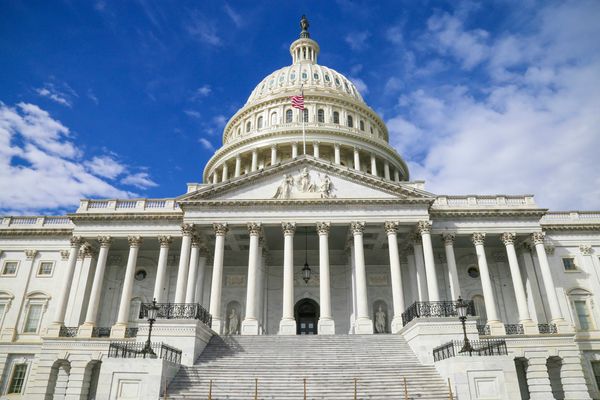pfa's
Environment takeaways from the spending deal
Advocates raise alarm over PFAS pollution from datacenters amid AI boom
Environmental groups are raising alarms that datacenters run by tech giants like Google and Microsoft could be releasing PFAS “forever chemicals” into air and water, compounding their climate and energy impacts as AI demand surges.
EPA moves to prioritize review of new chemicals for data centers
Opinion: Trump’s new science policy puts politics ahead of public health
Federal agencies can now elevate uncertainty and suppress dissent under a new executive order reshaping how science informs policy decisions.
In short:
- A new executive order allows political appointees to define scientific integrity and control what evidence federal agencies use in policymaking.
- Scientists who publicly dissent from political decisions risk being accused of misconduct, with no clear process for appeal.
- The U.S. Environmental Protection Agency is already delaying enforcement of PFAS drinking-water standards and canceling related research, citing uncertainty despite strong evidence of health harms.
Why this matters:
The integrity of science in government decisions is vital for protecting public health and the environment. When officials obscure or downplay evidence — especially on issues like PFAS contamination, climate impacts, or air pollution — it delays action and puts people at risk. PFAS compounds, for example, have been linked to cancer, immune dysfunction, and developmental harm, especially in children. If agencies are forced to treat inconclusive or incomplete data as a reason to do nothing, health protections will erode. Moreover, punishing scientists for speaking out creates a chilling effect that undermines transparency and slows the advancement of knowledge. Regulatory systems built to protect people then become tools for shielding polluters, with lasting consequences for communities and ecosystems.
Learn more: Scientists produce anti-autocracy handbook to protect their work and defend democracy
Animals can tell us what pollution is left behind
Preserved birds, fish, and coral are helping scientists reconstruct decades of toxic pollution, filling in environmental data gaps and pointing to hidden health risks today.
In short:
- Researchers are turning to natural history museum specimens to track historical pollution, revealing how chemicals like lead and mercury have saturated both wildlife and human communities.
- A study found that house sparrows living near lead-mining towns in Australia had blood-lead levels that closely mirrored those of children living in the same areas.
- Coral skeletons from Spain’s Mediterranean coast captured fossil fuel pollution spikes from 1969 to 1992, helping pinpoint when human impact on the planet sharply accelerated.
Key quote:
“These specimens that exist in collections around the world have incidentally captured environmental samples from places and times that we can never return to, so we can use them to backfill the environmental record.”
— Shane DuBay, biologist at the University of Texas at Arlington and lead author on the study
Why this matters:
Archives of animal tissue are doing something our governments and industries often fail to do: preserving the evidence. Coral skeletons, like geological black boxes, are chronicling decades of fossil fuel pollution, pinpointing with grim precision when humanity hit the gas on planetary damage. In a world still battling with mercury, PFAS, and microplastics, the past isn’t past. It’s embedded in flesh and bone.
Read more: Why is the chemical industry pitting public health against economic growth?
Locals challenge Oregon landfill’s toxic reach and corporate control
A rural Oregon community is battling the expansion of one of the state’s largest landfills, raising alarms over methane leaks, PFAS pollution, and a waste industry built to bury accountability.
In short:
- The Coffin Butte Landfill, now owned by Republic Services, has quietly become Oregon’s second-largest dump, leaking methane and toxic “forever chemicals” into nearby air and water.
- Community group VNEQS organized to stop a proposed expansion onto land once promised as a buffer; their research revealed widespread regulatory failures and troubling health complaints.
- Workers exposed unsafe conditions and U.S. Environmental Protection Agency reports confirmed major gas leaks, yet no penalties have been issued, prompting residents to push for stronger emissions monitoring laws.
Key quote:
“I didn’t know whistleblowing brought on a kind of PTSD. You have the photos, the emails, and still you’re getting gaslit, they’re saying, ‘No, these things aren’t happening.’ Sitting around waiting for an unemployment check, you start questioning yourself. It’s just hellish.”
— Robert Orton, former landfill heavy equipment mechanic and whistleblower
Why this matters:
Leaking methane, seeping PFAS, and bleeding public trust, the Coffin Butte Landfill is emblematic of a system that’s been eroding under the weight of deregulation and corporate convenience. As climate risks grow and federal protections contract, local fights like this one are shaping the future of waste management and who bears the cost.
Read more: Pollution from a Pennsylvania landfill caused problems for decades. Fracking waste made it worse
Fracking operators in Colorado dodge chemical disclosure rules despite legal mandate
Colorado oil and gas companies have injected at least 30 million pounds of chemicals underground in the past 18 months without complying with state rules requiring full disclosure of their ingredients.
In short:
- Despite Colorado’s 2022 law banning PFAS use and mandating full chemical disclosure within 150 days of fracking operations, more than 60% of wells fracked since July 2023 lack required filings. Chevron, operating over 375 such wells, is the largest non-compliant operator.
- A blowout at Chevron’s Noble Bishop site in April released toxic chemicals into the air near Galeton, exposing residents to benzene levels up to 10 times the safety threshold. Students measuring air quality at the site described overwhelming fumes and health effects.
- Environmental and public health advocates say the lack of transparency hampers medical care, exposes communities to toxic substances, and undermines state efforts to protect water, air, and health. Enforcement of disclosure rules remains weak nearly two years after the law took effect.
Key quote:
“This just kind of proves that you need to be transparent about what you’re putting in those wells. Because when incidents like this happen, people don’t know what they’re breathing, they don’t know what’s going into the air.”
— Jared Stickney, graduate student, Colorado State University
Why this matters:
Colorado’s attempt to lead the nation with stricter transparency laws was meant to pierce the veil of “trade secret” protections that have long shielded the oil and gas industry from scrutiny. But the weak enforcement of these new rules leaves many residents vulnerable to unknown exposures. PFAS and other persistent chemicals used in drilling fluids can contaminate drinking water, linger in the environment, and accumulate in the human body over time. Even short-term exposure to substances like benzene is linked to leukemia and other health problems. And when spills and blowouts occur, the lack of chemical disclosure means first responders and medical professionals are left guessing about what people were exposed to.












